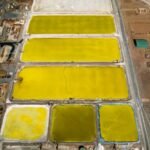Resilience and Technological Innovation: Ukraine’s Lessons for the Future
The ongoing conflict in Ukraine has revealed a powerful lesson – that resilience and technological innovation are not just crucial for survival, but also for building a better future for developing economies. Despite the war tearing through their fertile lands, Ukrainian farmers are defying the odds by harnessing AI-powered drones to clear their mine-scarred fields. This innovative spirit holds the potential to address not only the challenges of war but also those of climate change and food insecurity.
In his book on “Strategy,” Lawrence Freedman aptly declares information superiority as the lifeblood of modern warfare. This dominance, fueled by intricate sensors, lightning-fast networks, and sophisticated modeling, now casts a long shadow over Ukrainian fields. Both sides in the conflict deploy drones, engaging in a deadly tango of survey and attack.
However, behind the grim reality of war, a curious paradox emerges. The invasion serves as a brutal incubator for technological advancement, much like the Cold War space race that birthed GPS and countless other breakthroughs. Could this tribulation, instead of producing more weapons, yield tools for food security and climate adaptation?
Consider the farmers of Ukraine, who defy the hail of shells to decontaminate their lands using AI-powered mine detection. Their tenacity, combined with the precision of advanced technology, offers a glimpse into a future where drones map not battlefields but fertile soil, guiding precision agriculture and optimizing land use.
Caitlin Welsh of the Center for Strategic and International Studies underscores the urgency of ending the war and enabling Ukrainian and Russian farmers to resume production. It is not just good for them, but for the entire world. Given that these two nations account for a significant portion of global wheat, maize, and sunflower trade, their agricultural return is crucial in averting the menace of global famine.
Yet, the lessons extend beyond trade. The satellite eyes that scan for enemy movements can be trained to map drought-stricken landscapes and predict extreme weather events. Battlefield technologies can bolster early warning systems, saving lives and livelihoods from the fury of climate change.
Information, often seen as a potent weapon, can become a bridge. Instead of fueling conflict, it can connect farmers across borders, facilitating the sharing of knowledge on drought-resistant crops and sustainable practices. Kenya, with its burgeoning tech scene, deep understanding of agriculture, and strong diplomatic standing, is uniquely positioned to champion this approach to knowledge sharing. By embracing open forums, collaboration, and co-creation, Kenya can foster an environment where ideas can cross borders and flourish.
Imagine Nairobi hosting knowledge summits, bringing together Ukrainian and Kenyan farmers, tech experts, and climate scientists. Kenyan engineers could adapt and refine Ukrainian drone technology for soil mapping and water management in drought-stricken regions. Kenyan diplomats could build alliances with nations affected by climate change, sharing these tools and fostering a global network of resilience.
It is time for Kenya to rise as a bridge, not just between warring nations, but between the battlefields of the present and the breadbaskets of the future. By nurturing partnerships, championing open knowledge exchange, and adapting battlefield technology for good, Kenya can play a pivotal role in turning bombs into bytes and battlefields into breadbaskets. The fight for a sustainable future may begin in the fields of Ukraine, but it will be won in the collaborative spirit of shared knowledge and technology – a spirit that Kenya can proudly champion.




